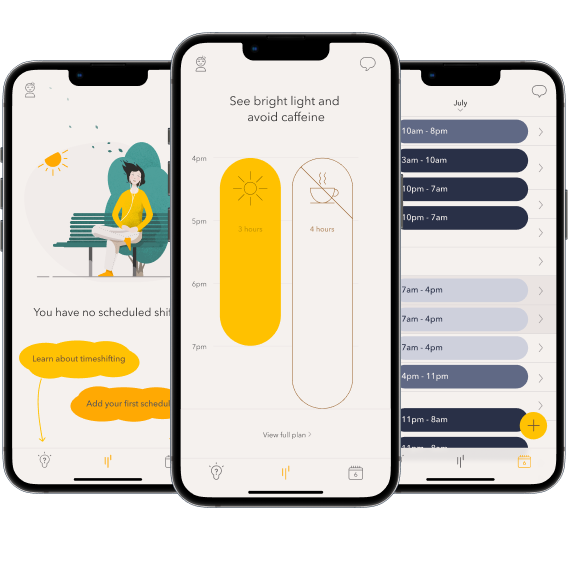What are circadian rhythms?
Circadian rhythms are the natural biological processes that regulate the sleep-wake cycle and other physiological processes in living beings. These rhythms are driven by an internal “biological clock” located in the hypothalamus of the brain and are influenced by external cues, such as light and temperature.
The circadian rhythm is an essential part of our biology, playing a crucial role in regulating our sleep patterns, metabolism, hormone levels, and other physiological functions. A healthy circadian rhythm helps to ensure that we feel awake and alert during the day, and can fall asleep easily at night.
However, many modern lifestyle habits can disrupt our natural circadian rhythm, leading to various health problems, including insomnia, depression, and even obesity. Artificial light exposure, jet lag, and shift work are just a few of the factors that can interfere with our biological clock.
To maintain a healthy circadian rhythm, it’s important to establish a consistent sleep schedule and to limit exposure to artificial light in the evenings. Natural light exposure during the day can also help to regulate the circadian rhythm and promote better sleep. Additionally, avoiding caffeine and alcohol in the evenings and practicing relaxation techniques such as meditation can also help to improve sleep and maintain a healthy biological clock.
How do circadian rhythms affect sleep?
Circadian rhythms play a crucial role in regulating sleep patterns. The circadian clock in the brain regulates the release of hormones and other substances that control the sleep-wake cycle. In the evening, levels of the sleep-promoting hormone melatonin rise, while in the morning, levels of the wake-promoting hormone cortisol rise. These changes help to regulate the timing and quality of sleep.
When the circadian rhythm is disrupted, it can lead to insomnia or other sleep problems. This can occur as a result of factors such as shift work, jet lag, exposure to artificial light, or changes in sleep routines. In these cases, the normal pattern of hormonal changes is disrupted, leading to sleep disturbances.
It's important to maintain a consistent sleep schedule and limit exposure to artificial light in the evenings in order to keep the circadian rhythm in check and ensure restful sleep. By taking steps to regulate sleep patterns, people can improve the overall quality of their sleep and reduce the symptoms of sleep disorders.
What factors can disrupt circadian rhythms?
Circadian rhythms can be disrupted by various internal and external factors, including:
Shift work: Working non-standard hours or rotating shifts can throw off the body's internal clock and lead to circadian rhythm disruptions.
Jet lag: Traveling across time zones can affect the body's ability to adjust to the new schedule and can cause jet lag, which is a type of circadian rhythm disorder.
Artificial light exposure: Exposure to artificial light, especially in the evenings, can interfere with the normal release of melatonin and disrupt the sleep-wake cycle.
Changes in sleep patterns: Deviating from a regular sleep schedule, such as staying up late on weekends, can cause disruptions to the circadian rhythm.
Chronic stress: Chronic stress has been linked to changes in circadian rhythm and can interfere with normal sleep patterns.
Ageing: As people age, their circadian rhythm tends to shift, making it more difficult to maintain a consistent sleep schedule.
Medical conditions: Certain medical conditions, such as depression and seasonal affective disorder, can also disrupt circadian rhythms.
Substance use: Alcohol and caffeine consumption, especially in the evenings, can interfere with sleep and disrupt circadian rhythms.
By identifying the factors that may be disrupting your circadian rhythm and taking steps to address them, you can help to regulate your sleep-wake cycle and improve the quality of your sleep.
How can I improve my circadian rhythms?
Here are some tips to help improve your circadian rhythms:
Maintain a consistent sleep schedule: Try to go to bed and wake up at the same time every day, even on weekends.
Limit exposure to artificial light: Reduce exposure to bright screens, such as televisions, computers, and smartphones, in the evenings and opt for dimmer lighting instead.
Get regular exercise: Regular physical activity during the day can help regulate the circadian rhythm and improve sleep.
Avoid caffeine and alcohol: Limit caffeine consumption, especially in the evenings, and avoid alcohol before bedtime as it can disrupt sleep patterns.
Exposure to natural light: Get plenty of natural light during the day, especially in the mornings, to help regulate the circadian rhythm.
Practice relaxation techniques: Engage in relaxation techniques such as meditation, deep breathing, or yoga to help reduce stress levels and improve sleep.
Avoid naps: Try to limit napping during the day, as it can interfere with the normal sleep-wake cycle.
By incorporating these habits into your daily routine, you can help regulate your circadian rhythm and improve the quality of your sleep. However, if you continue to experience sleep problems, it's a good idea to consult a doctor or sleep specialist for further evaluation and treatment.
What is the role of light in regulating circadian rhythms?
Light plays a crucial role in regulating circadian rhythms. The hypothalamus in the brain, which acts as the body's internal clock, responds to light and dark signals to regulate the release of hormones that control the sleep-wake cycle.
In the morning, exposure to bright light (such as sunlight) helps to reset the circadian clock and promote wakefulness. In the evenings, the lack of light signals the release of the sleep-promoting hormone melatonin, which helps to initiate the sleep process.
Artificial light sources, such as televisions, computers, and smartphones, can interfere with the normal release of melatonin and disrupt the circadian rhythm. This is why it's important to limit exposure to bright screens in the evenings and opt for dimmer lighting instead.
By regulating light exposure, people can help to keep their circadian rhythm in check and improve the quality of their sleep. This may involve creating a sleep-conducive environment by reducing artificial light exposure in the evenings and incorporating bright light exposure in the mornings.
How do circadian rhythms change as we age?
Circadian rhythms change as people age. As people get older, their circadian rhythm tends to shift, making it more difficult to maintain a consistent sleep schedule. This can lead to age-related sleep disorders, such as insomnia and excessive daytime sleepiness.
There are several factors that contribute to changes in circadian rhythm as people age, including:
Decreased sensitivity to light: With age, the eyes become less sensitive to light, which can make it more difficult to regulate the circadian rhythm.
Changes in hormone levels: Hormones that regulate the sleep-wake cycle, such as melatonin, decline with age, which can contribute to sleep disturbances.
Medical conditions: Certain medical conditions, such as dementia and Parkinson's disease, can disrupt circadian rhythms and contribute to sleep problems in older adults.
Medications: Certain medications, such as beta blockers and antihistamines, can also interfere with sleep patterns and disrupt the circadian rhythm.
It's important for older adults to prioritize good sleep hygiene and maintain a consistent sleep schedule in order to regulate their circadian rhythm and improve the quality of their sleep. This may involve creating a sleep-conducive environment, limiting exposure to artificial light in the evenings, and engaging in physical activity during the day. If you continue to experience sleep problems, it's a good idea to consult a doctor or sleep specialist for further evaluation and treatment.
How can I reset my circadian rhythms?
Here are some steps you can take to reset your circadian rhythm:
Establish a consistent sleep schedule: Go to bed and wake up at the same time every day, even on weekends, to help regulate your internal clock.
Limit exposure to artificial light: Reduce exposure to bright screens, such as televisions, computers, and smartphones, in the evenings and opt for dimmer lighting instead.
Get regular exercise: Regular physical activity during the day can help regulate the circadian rhythm and improve sleep.
Avoid caffeine and alcohol: Limit caffeine consumption, especially in the evenings, and avoid alcohol before bedtime as it can disrupt sleep patterns.
Exposure to natural light: Get plenty of natural light during the day, especially in the mornings, to help regulate the circadian rhythm.
Practice relaxation techniques: Engage in relaxation techniques such as meditation, deep breathing, or yoga to help reduce stress levels and improve sleep.
Adjust your environment: Create a sleep-conducive environment by making your bedroom cool, dark, and quiet.
Gradually adjust your sleep schedule: If you need to change your sleep schedule, do so gradually over the course of several days.
By incorporating these habits into your daily routine, you can help regulate your circadian rhythm and improve the quality of your sleep. If you continue to experience sleep problems, it's a good idea to consult a doctor or sleep specialist for further evaluation and treatment.
New app for shift workers
Timeshifter's shift work app is an entirely new way for shift workers to optimize their sleep, alertness, and quality of life. Import your work schedule to get highly personalized advice.

Jet lag is history.
Timeshifter's jet lag app is the most-downloaded and highest-rated jet lag app in the world. Get personalized jet lag plans based on your sleep pattern, chronotype, itinerary, and personal preferences.

Other articles







